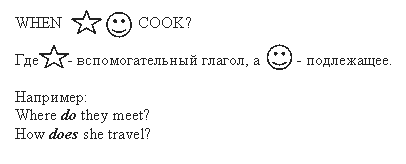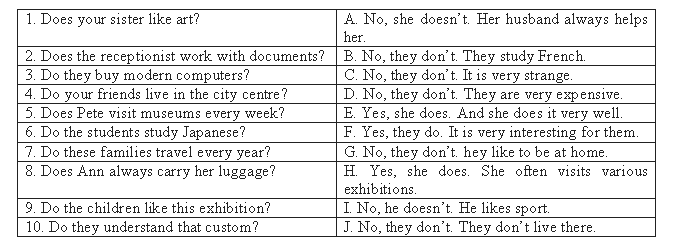FOCUS ON GRAMMAR Активная грамматика
Language focus 1
The Present Simple (Indefinite) Tense
Настоящее простое (неопределенное) время
Настоящее простое (неопределенное) время используется для выражения обычного, периодически повторяющегося действия. Наречия-определители: часто, всегда, никогда, каждый день, каждый год, каждый месяц, иногда. В русском переводе глагол стоит в настоящем времени. Например: Он обычно читает газету по утрам. Она никогда не завтракает.
Утвердительные предложения

В третьем лице единственного числа глагола – окончание «s» / «es». Во всех остальных формах глагол – без изменений.
Если глагол заканчивается на свистящий, шипящий звук, то в третьем лице единственного числа окончание «es», которое произносится [iz]. Также это относится к глаголам do и go, форма третьего лица единственного числа которых does (но произносится она [daz]) и goes [gouz].
Особую форму имеет глагол have. В третьем лице единственного числа используется форма has.
Если глагол заканчивается на «y» с предшествующей согласной, то y меняется на «i», и прибавляется окончание «es»: She carries (to carry). Но: She buys (to buy – перед y – гласная).
Например:
3 лицо единств. число
He watches TV every evening.
She does it every day.
She goes to school in the morning.
He lives in Moscow.
It has three legs.
My wife works for this company.
She copies this text every day.
Остальные формы
They watch TV every evening.
Their friends do it every day.
The children go to school in the morning.
I live in Moscow.
The tables have three legs.
We work for this company.
You copy this text every day.
Наречия-определители
Often – часто
Always – всегда
Never – никогда
Usually – обычно
Seldom – редко
Every year / day / month / week – каждый год / день / месяц / каждую неделю
Например:
She goes to work every day.
My brother seldom plays tennis.
My husband usually buys newspapers.
I never speak to them.
He always studies foreign languages.
We travel every month.
1. Write in the verbs in the correct form.
Напишите глаголы в правильной форме.

2. Read and translate the sentences. Pay attention to the forms of the verbs.
Прочитайте и переведите предложения. Обратите особое внимание на произношение окончаний глаголов.
1. She often relaxes in the evening. ………………………………………………………….
2. David cooks dinner every day. ………………………………………………………….
3. It has a big door. ………………………………………………………….
4. Don buys new books every week. ………………………………………………………….
5. She seldom goes to the city centre. ………………………………………………………….
6. He never visits museums. ………………………………………………………….
7. Sally often travels to the South. ………………………………………………………….
8. They meet friends every morning. ………………………………………………………….
9. I seldom watch modern shows. ………………………………………………………….
10. He gets up at seven every day. ………………………………………………………….
11. He always carries her luggage. ………………………………………………………….
12. This receptionist never helps me. ………………………………………………………….
13. We usually have lunch here. ………………………………………………………….
14. She does it every year. ………………………………………………………….
15. He usually goes to work at eight. ………………………………………………………….
3. Complete the sentences. Pay attention to the forms of the verbs.
Закончитепредложения. Обратите особое внимание на написание окончаний глаголов.
Example: She often……………………………….
She often cooks dinner.
1. He seldom………………………………………………………………………………………..
2. They never……………………………………………………………………………………….
3. Pat usually……………………………………………………………………………………….
4. Every year we……………………………………………………………………………………
5. She……………………………………………………………………………………every day.
6. It often…………………………………………………………………………………………..
7. My friends always……………………………………………………………………………….
8. Every month Cathy………………………………………………………………………………
9. His wife often……………………………………………………………………………………
10. I never…………………………………………………………………………………………..
4. There is one mistake in each sentence. Find and correct it.
Найдите ошибку в каждом из данных предложений.
1. She buies bananas every week. …………………………..
2. Their children goe to school every morning. …………………………..
3. She watchs TV every evening. …………………………..
4. Your sister relaxees every week. …………………………..
5. We cook often pizza. …………………………..
6. Ann go to work every day. …………………………..
7. My mother haves three children. …………………………..
8. He studys German at achool. …………………………..
5. Translate the sentences into English.
Переведите предложения на английский язык.
1. Он путешествует в Египет каждый год. ………………………………………………..
2. Его дети редко ходят в музеи. ………………………………………………..
3. Он всегда несет багаж своей жены. ………………………………………………..
4. Я часто смотрю в окно по вечерам. ………………………………………………..
5. Пэт изучает немецкий в школе. ………………………………………………..
6. Он никогда не ходит на работу по утрам. ………………………………………………..
7. Она любит искусство Востока. ………………………………………………..
8. Он обычно добирается до центра города на машине (by car)…………………………………..
9. Мы редко слушаем современную музыку. ………………………………………………..
Language focus 2
The Present Simple (Indefinite) Tense
General and Special Questions
Настоящее простое (неопределенное) время
Общие и специальные вопросы
Чтобы задать общий вопрос, используется вспомогательный глагол do или does в зависимости от лица. Для третьего лица единственного числа, где глагол имеет окончание «s» / «es», используется вспомогательный глагол does. В вопросе он как бы «съедает» окончание «s» и «es» глагола.
Например:
She plays tennis.
Does she play tennis? – Она играет в теннис?
He goes to work every day.
Does he go to work every day? – Он ходит на работу каждый день?
Для всех остальных лиц и чисел (где нет окончания «s» / «es») используется вспомогательный глагол do.
Например:
They often listen to modern music.
Do they often listen to modern music?
You travel every year.
Do you travel every year?
Для того чтобы дать краткий утвердительный ответ, используется соответствующий вспомогательный глагол do или does.
Do you travel every year? Yes, I do.
Does she like the museum? Yes, she does.
Для того чтобы дать отрицательный ответ, снова используется соответствующий вспомогательный глагол do или does.
She lives in London. Does she live in London? She doesn’t (does not) live in London.
They meet every week. Do they meet every week? They don’t (do not) meet every week.
Чтобы задать специальный вопрос, используется такая формула:
Вопросительное слово+вспомогательный глагол+подлежащее+основная форма глагола?
Или короче,

7. Ask General Questions. Give negative answers.
Задайте общие вопросы. Дайте отрицательные ответы.
Example: He always gives her presents. Does he always give her presents? He doesn’t always give her presents.
1. They speak French every day.
2. He often studies in the evening.
3. She has a modern computer.
4. My sister calls me Dan.
5. The receptionist usually works with documents.
6. He likes modern art.
7. My friends seldom visit museums.
8. We often send letters to our friends.
8. Complete the questions.
Закончите вопросительные предложения.
1. Does she………………………………………………………………………………………..?
2. Does your friend……………………………………………………………………………….?
3. Do they…………………………………………………………………………………………?
4. Do you………………………………………………………………………………………….?
5. Do your guests………………………………………………………………………………….?
6. Does the artist…………………………………………………………………………………..?
7. Does your husband……………………………………………………………………………..?
8. Do your children……………………………………………………………………………….?
9. Match the questions with the answers.
Подберите подходящий ответ к каждому вопросу.

10. Read the questions and translate them. Underline the auxiliary verb.
Прочитайте вопросительные предложения и переведите их. Подчеркните вспомогательный глагол.
1. Where do they buy modern programmes?……………………………………………………….
2. Why do they live in the city centre?………………………………………………………….….
3. When does he visit this exhibition? ………………………………………………………….….
4. With whom do they study English?…………………………………………………………..….
5. Do they know various customs?..…………………………………………………………….….
6. When does this shop work? …………………………………………………………………….
7. When does she send letters?………………………………………………………………….….
8. What does she always show the guests?…………………………………………………………
9. How do you get to that bridge?………………………………………………………………….
10. Where does he travel every year?………………………………………………………………
11. Ask one General and one Special question.
Задайте один общий и один специальный вопрос.
Example: My sister travels to the east every year.
Does my sister travel to the east every year?
Where does my sister travel every year?
1. Dan drives a car very well.
2. They often see this bridge.
3. They study simple things.
4. We like this receptionist.
5. Denis Shevchuk calls me every day.
6. I send her letters every week.
7. He shows them the Underground.
12. Give negative answers.
Напишите отрицательные ответы.
1. Can you visit this church?
2. Do you often visit this church?
3. Does she always visit this church?
4. Do they like the modern museum?
5. Is this a modern museum?
6. Are these modern museums?
7. Can you see a modern museum in the city centre?
Более 800 000 книг и аудиокниг! 📚
Получи 2 месяца Литрес Подписки в подарок и наслаждайся неограниченным чтением
ПОЛУЧИТЬ ПОДАРОКДанный текст является ознакомительным фрагментом.